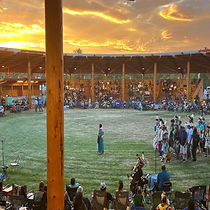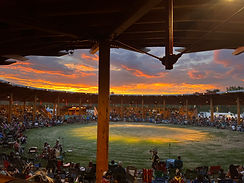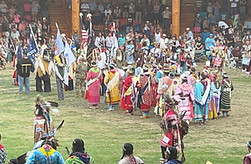CROW NATION FACTS
-
The Crow Reservation is in south-central Montana. Its area is about 2,300,000 acres (9,300 km2), making it the fifth-largest Indian reservation in the United States and the largest of seven in Montana.
-
The Crow Tribe has a membership of approximately 11,000, of whom approximately 7,900 reside on the Crow Indian Reservation in south central Montana.
-
In the past, they lived in the Yellowstone River valley, which is in Wyoming, Montana, and South Dakota. Today, they are federally recognized as the Crow Tribe of Montana.
-
Since the 19th century, most Crow people have lived on their reservation that is south of Billings, Montana.
-
Crow comes from Apsáalooke which means "children of the large-beaked bird".


Flag of the Crow Nation
Crow Fair Information
-
Here are some key facts about Crow Fair in Crow Agency, MT
-
Annual Event: Crow Fair is held annually in mid-August on the Crow Indian Reservation in Crow Agency, Montana. It is one of the largest gatherings of Native Americans in North America.
-
"Tipi Capital of the World": The event is known as the "Tipi Capital of the World" because it attracts thousands of Native Americans who set up over 1,000 tipis, creating a massive camp along the Little Bighorn River.
-
Cultural Significance: Crow Fair celebrates Crow (Apsáalooke) culture, heritage, and traditions, with ceremonies, dances, and storytelling that honor the Crow people's history and values.
-
Powwow and Dance Competitions: The fair features one of the largest Native American powwows, with dance competitions in categories like traditional, fancy, and jingle dress dancing, showcasing intricate regalia and dance styles.
-
Parade: Each day of the fair begins with a morning parade, where participants ride horseback or in traditional outfits, celebrating the vibrant Crow culture.
-
Horse Racing: Crow Fair includes horse races, an event that has been a significant part of the Crow people’s lifestyle and a longstanding tradition at the fair.
-
Rodeo Events: The fair hosts an all-Indian rodeo, with events like bull riding, bareback riding, and barrel racing, highlighting the horsemanship and rodeo skills of Native American participants.
-
Vendors and Arts: Numerous vendors sell Native American arts and crafts, including beadwork, jewelry, and textiles, offering a glimpse into the artistic heritage of the Crow and other tribes.
-
Spiritual and Family Gathering: Crow Fair is both a spiritual event and a family reunion, as Crow families and other Native Americans from around the country come together to celebrate their shared traditions.
-
Open to Visitors: While primarily a Native American gathering, Crow Fair is open to non-Native visitors, allowing them to witness and respect the traditions and culture of the Crow people.
-
Historical Roots: The fair began in 1904 as a way to encourage Crow people to gather, celebrate their culture, and showcase their traditions, which has expanded into a multi-day event rich in cultural display.




.jpg)
Valley of the Chiefs Productions


_PNG.png)
